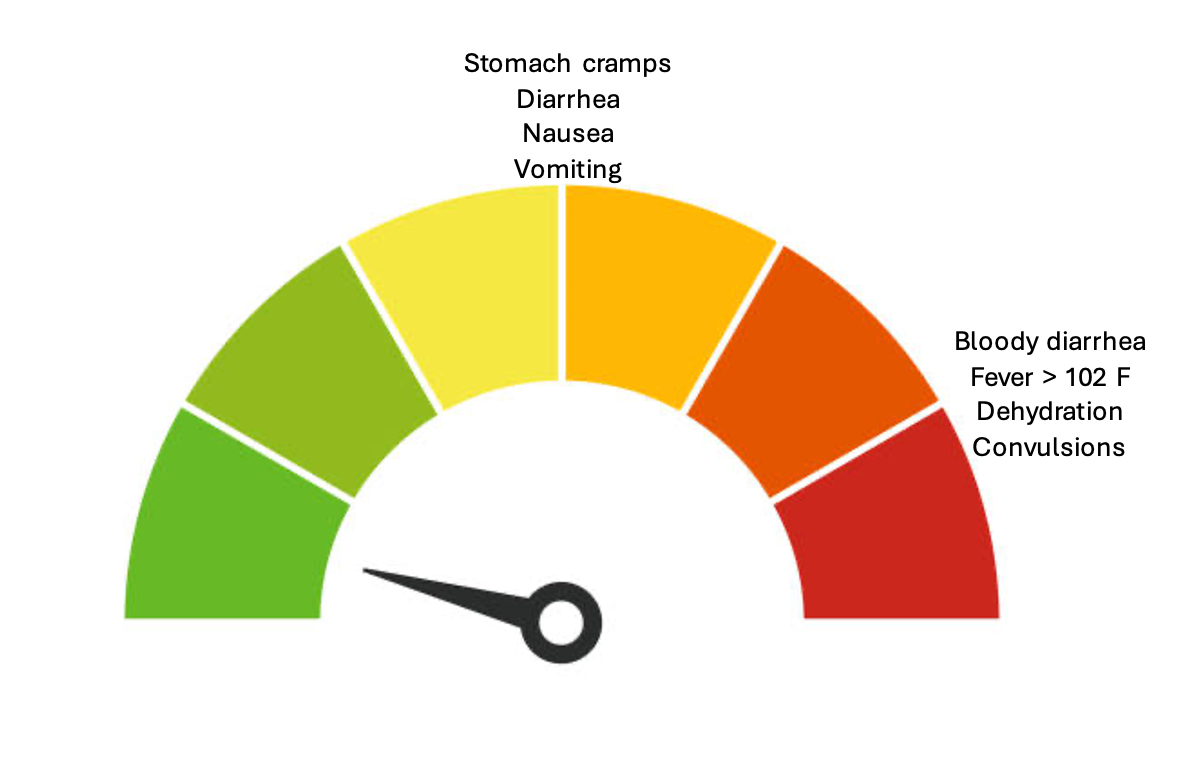Food Recalls and Your Child
A news alert pops up on your phone: there has been a recall of organic carrots because
of E. coli. Oh no! You remember packing carrots in your children’s lunch boxes this
morning. Food recalls can be concerning and might affect your family’s health. When
these events happen, like recent recalls of carrots and cucumbers, it’s important to
know what steps to take and what warning signs to watch for.
Foods can be recalled by the Food and Drug Administration (FDA) if there is a problem,
like incorrect labeling or if the food could make people sick. The FDA learns about these
issues when two or more people get sick from eating the same contaminated food.
Food can get contaminated at any step—from being grown on a farm to being sold in
stores or prepared at home. For example, dirty water might be used to water crops,
storage bins might have germs, refrigerated foods might get too warm, or food might be
prepared in unsanitary conditions.
Even though farmers, sellers, and food preparers work hard to keep food safe, about 48
million people in the U.S. still get sick from foodborne illnesses each year. Children are
more likely to get sick because their immune systems are not as strong as those of
adults.
The chart below shows some of the most common disease-causing germs in the United
States.
| Organism | Food Sources | Onset of Symptoms | Symptoms | Duration |
|---|---|---|---|---|
| Norovirus | Person to person; contaminated water or food | 12 hours-2 days | Projectile vomiting, diarrhea, headache, fever, muscle aches | 1-3 days |
| E. coli | Water or food contaminated with human feces | 1-3 days | Watery diarrhea, abdominal cramps, some vomiting | 3-7+ days |
| Salmonella | Eggs, poultry, meat, unpasteurized milk/juice, cheese, raw fruit and vegetables | 6-48 hours | Diarrhea, fever, abdominal cramps, vomiting | 4-7 days |
| Listeriamonocytogenes | Unpasteurize d milk, soft cheeses made with unpasteurized milk, ready to eat deli meats | 9-48 hours (gastrointestina l symptoms); 2- 6 weeks (invasive disease) | Fever, muscle aches, nausea, diarrhea. Pregnant people, the elderly, and immunocompromised at risk for severe disease. | Variable |
| Campylobacter | Water, unpasteurized milk or cheese, raw/ undercooked poultry | 2-5 days | Nausea, vomiting, diarrhea (sometimes bloody), cramps | 10 days |
As you can see, these germs can cause a variety of symptoms. But which symptoms
are worrisome?

Common symptoms of foodborne illnesses are upset stomach, vomiting, diarrhea, and
fever. Mild to moderate symptoms include stomach cramps, diarrhea, nausea, and
vomiting. Severe symptoms, like bloody diarrhea, fever over 102°F, convulsions
(seizures), or dehydration, need quick attention.
Vomiting and diarrhea can lead to dehydration, especially in young children. Infants can
go 3 to 4 hours without food or liquids, while older kids can go 6 to 8 hours. If your
child’s symptoms last longer than this without enough fluids, contact a doctor. Watch for
signs of dehydration, such as low energy, dry mouth, or—in severe cases—extreme
sleepiness and sunken eyes.
If you’re ever unsure, it’s always better to check with a healthcare provider.
Knowing basic food safety tips can help keep your family safe. At the grocery store,
check the “sell by” dates, keep raw meat in separate bags from other groceries, and
only buy pasteurized dairy and juice. At home, refrigerate perishable food (like fruits and
vegetables) within 2 hours of buying it. Keep raw meat separate in the fridge or freezer.
Wash your hands with soap and water for 20 seconds before and after handling food,
using the bathroom, changing diapers, or touching pets. Rinse fruits and vegetables
with water and a brush before cutting into them. Also, clean cutting boards and counters
after using them for raw meat.
Be sure to put leftovers in the fridge within 2 hours of serving. Leftovers can stay in the
fridge for 3-4 days or in the freezer for 3-4 months. Finally, check FoodSafety.gov for
updates on food recalls and throw away any recalled items you might have at home.
By keeping these things in mind, you can keep mealtime safe and enjoyable for your
family while reducing the risk of foodborne illnesses.
Destri Eichman MS3 University of Missouri School of Medicine Springfield Clinical Campus










